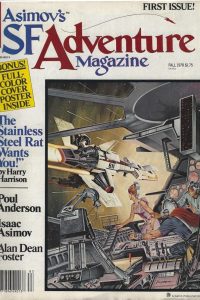Lucius Shepard (1943-2014)
Writer Lucius Shepard died March 18, 2014 in Portland OR. Shepard had suffered health complications during the last year including a stroke and a spinal infection.
Lucius Taylor Shepard was born on August 21, 1943 in Lynchburg VA and grew up in Florida. He spent years in his teens and twenties traveling, and recounted stories of living and traveling in North and Latin America, the Caribbean, Asia, North Africa, and the Middle East. After residing in California, New York, and Nantucket, Shepard relocated to the Pacific Northwest in the ’90s, living in Seattle and Vancouver WA, and finally Portland OR.
His first pro genre sale was “The Taylorsville Reconstruction” for Universe 13 (1983). His work typically incorporated SF, fantasy, and horror, often in the same piece. First novel Green Eyes (1984) was SF with voodoo and zombies, and helped earn him the John W. Campbell Award for Best New Writer in 1985. 1986 novella “R&R” won a Nebula Award, and became part of his second novel, Life During Wartime (1987). After a period during which he stopped writing long fiction for years, several appeared after the turn of the century: Valentine (2002), Colonel Rutherford’s Colt (2003), Floater (2003), Viator (2004), A Handbook of American Prayer (2004), and Softspoken (2007), which won an International Horror Guild Award.
Many of his novellas and collections garnered awards nominations and several wins. His fantasy stories set in the world of Griaule, novelette “The Man Who Painted the Dragon Griaule” (1984) and novellas The Scalehunter’s Beautiful Daughter (1988), The Father of Stones (1989), Liar’s House (2004), The Skull (2012) were nominated for numerous awards. Shepard has always excelled at novella length. Other important novellas include fantasy Kalimantan (1990), horror The Last Time (1995), SF “Barnacle Bill the Spacer” (1992), which won a Hugo, and The Dragon Griaule (2012). “Crocodile Rock” (1999) won an International Horror Guild Award, as did Louisiana Breakdown (2003); “Radiant Green Star” (2000) won a Hugo and a Locus Award; “Over Yonder” (2002) won a Sturgeon award, and “Vacancy” (2007) won a Shirley Jackson Award.
For more, see his entry in the Encyclopedia of Science Fiction. A complete obituary with appreciations will appear in the May 2014 issue of Locus.


